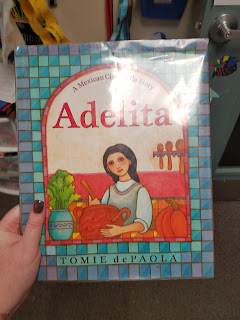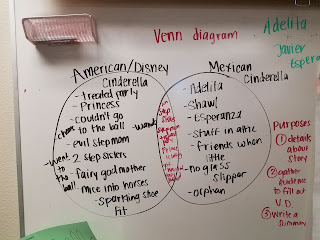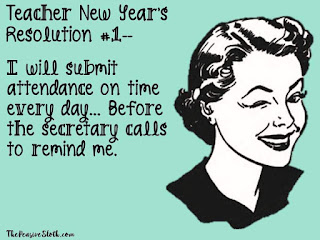I've started a good dozen different blog topics, uploaded pictures, but keep coming back to this one.
It's almost March, which means we're in the final stretch of the school year. It's been a wonderful year with my students, but I can't help but to zoom in on some of the challenges I've faced this year.
Pacing
I disagree with our grade level chair on pacing and classroom practices. His strategies work for him and he's a great teacher, but his methods don't work for me.
He's also used to doing a bulk of the work for the grade level, which I'm sure has been a shift for him to include others in planning decisions.
However, we made the long range plans last year and I just sort of agreed to what had been always done. I didn't feel a sense of ownership because I was new to the grade level.
Being new to the grade level and having student teachers were an adjustment as well.
However, now that I'm feeling more comfortable with the third grade material, I think it's time to take a closer look at the long range plans. For me, it was something that was just completed as quickly as possible to check off a box on a list from admin. I didn't feel a sense of ownership and I rarely, if ever, looked at them.
That mindset isn't really helpful.
So I've begun drafting out my long range plans for next year but I'm making them more meaningful to me. I'm including hyper links to ideas, pinterest images, mentor text ideas, and put in a weekly social studies or science focus.
I also hope to get to create my own schedule next year. The provided one (language/writing/math/lunch/reading/specials/reading/computers) isn't really working for me. I know I can't change specials or lunch, but I'd like to start my day with computers/RTI instead of leaving it for the end of the day.
Math
I've done a good job with having my students take daily multiplication tests to track their fluency and progress towards mastery, but I don't like the tracking system I've been using. I also need to change how I have the forms organized. I also need to change the pacing to reflect NCTM's suggested guide: 1, 2, 10, 5, 0 (and so forth) as well as remove the expectation for 11s and 12s. I also need to do more math games that focus on skip counting before introducing the timed tests.
I've also incorporated more math stations into review days and practice tests before the real test, but there's still work to do.
I'm toying with the idea of station teaching for math next year.
5-10 minutes: hw check, number talk, multiplication fluency, entrance ticket
Station time: ( 3 daily stations for 20 minutes each)
1) With teacher for explicit instruction
2) computers/iPads/ST Math or math center (review/extension)
3) partner practice (on previous day's skill)
5-10 minutes: closure, discussion, hw distribution
Writing and Reading
I haven't been thrilled with my writing instruction (because it's the hardest subject to teach), so that was one subject I really put my best effort into this year. I've tried new strategies, explicitly included language lessons (rather than passively bringing it up), and used rubrics for every prompt (most of which were created with the students). We've done more publishing (typing) than ever before and I branched out with google docs.
However, all that intentional writing came at a price. I haven't done a read aloud with my students this year. I plan to re-start the one we did in October. I'm struggling to find the time. I haven't done a lot of work with syllable types and creating multi-syllabic words, due to time.
I'm not sure how to plan moving forward. I unfortunately don't always have the support from my grade level. I don't always work with people who pull their fair share of the work load, which is frustrating. As people, I like them all very much. As colleagues...there's some work to do. We are looking at the possibility of eight third grade teachers (yikes!) so realistically this would break down to two planning teams of 4.
I'm excited to try some new strategies next year, but am going to try and field test them this year. Fingers crossed!
Monday, February 19, 2018
Sunday, January 28, 2018
Revisiting Summaries
We've needed another refresher of summaries. Perhaps it's because of winter break, but my students seem to have forgotten that summaries are more than 4 words long.
Sigh, review time.
I used Lon Po Po so we could learn about folk tales from other countries while also reviewing summaries (RL 3.2). I like opportunities to imbed multiple skills at once.
We read the story and I had students work in partners to write a summary.
The next day, I read all the summaries and we gave feedback to one another. From there, I took all their ideas and created an anchor chart:
However, we took it one step further with color coding the parts (somebody, wanted, but,so, then).
I had student helpers:
By including my students in the process, there is more engagement. While the anchor charts aren't always pinterest quality, there is a benefit of making them with the students. If you present a pre-made one, they have no investment. It's something the teacher did. However, if you make it with them and include their ideas, they feel more connected to the content.
On day 3, we read this book:
We reviewed summaries, started talking about the lesson learned (pre-teaching theme), and compared and contrasted the story with Disney's version.
Many of my students have cultural ties to Mexico, so by chosing this story, not only am I addressing the multi-cultural parts of the standards, but I'm validating and embracing their culture. We talked about the beautiful art work, I had student helpers read the Spanish phrases in the book, and my students felt celebrated.
Sunday, January 14, 2018
Time will Tell
All puns aside, we've been working on time this week in math. I knew from my pre-test and from classroom observations that very, very few of my students retained telling time from their second grade teachers. Now this is by no means a reflection on the second grade teachers, but rather an observation...and it makes sense. As a society, we don't really see large analog clocks on a frequent basis (unless you're in a classroom or you've decorated with a statement clock, as I have) but see lots of digital clocks.
We spaced out learning about time into three days.
Day 1
We did a KWL chart on what we knew about time and cut out these clocks:
They were a {free download} from a fellow TpT seller. We color coded the different hands and labeled them.
I also had to explicitly teach how to use the brads:
Our goal for the first day was to learn the difference between the hands and tell time to the hour.
Day 2:
Today we used the second page from the above download. We zoomed in on the phrases half past, quarter past, and quarter til. This was a little tricky for them, so I'm glad we spent a day focused just on this skill.
They did notice I snuck in a mini lesson on fractions with the clock. Hey, testing is soon!
Day 3:
We made an anchor chart together:
We zoomed in on telling time to the exact minute. We warmed up with a {matching game} with analog and digital clocks.
Day 4:
We took a standardized test in the morning, so math today was just a short quiz and this {I have, Who Has?} game to review with table teams.
Up next?
We're going to make our schedules and focus on elapsed time. I plan to spend 2 days on this, one day focused on elapsed time under an hour and the following day events that are over an hour long.
The next lessons will focus on rounding, adding, and subtracting before starting a modified (shortened) version of Module 2 from Engage NY.
We spaced out learning about time into three days.
Day 1
We did a KWL chart on what we knew about time and cut out these clocks:
They were a {free download} from a fellow TpT seller. We color coded the different hands and labeled them.
I also had to explicitly teach how to use the brads:
Our goal for the first day was to learn the difference between the hands and tell time to the hour.
Day 2:
Today we used the second page from the above download. We zoomed in on the phrases half past, quarter past, and quarter til. This was a little tricky for them, so I'm glad we spent a day focused just on this skill.
They did notice I snuck in a mini lesson on fractions with the clock. Hey, testing is soon!
Day 3:
We made an anchor chart together:
We zoomed in on telling time to the exact minute. We warmed up with a {matching game} with analog and digital clocks.
Day 4:
We took a standardized test in the morning, so math today was just a short quiz and this {I have, Who Has?} game to review with table teams.
Up next?
We're going to make our schedules and focus on elapsed time. I plan to spend 2 days on this, one day focused on elapsed time under an hour and the following day events that are over an hour long.
The next lessons will focus on rounding, adding, and subtracting before starting a modified (shortened) version of Module 2 from Engage NY.
Labels:
elapsed time,
freebie,
hands on,
manipulatives,
time,
TpT
Monday, January 8, 2018
Second Semester, Day 1
We got through roughly half of what I'd planned for the day. We did a lot of goal setting today. But I don't necessarily think that was a bad thing.
We talked about the difference between goals and dreams.
From there, we talked about a goal vs. a SMART goal.
(This image is from my daily morning journals, available {here} and currently on sale).
We set reading, math, school, and life goals.
I modeled the differences between a goal and a SMART goal:
Yes, taking attendance on time is one of my goals. The office is quite pleased.
We then recorded our goals in our {flip book}.
We also reviewed the difference between daily, weekly, and monthly goals:
It was a busy, busy first day back. We also went to library, looked at our 50+ new books (I've been doing some cleaning), took the math pre-test, talked about our upcoming field trip, and got on the computer for Lexia practice.
We talked about the difference between goals and dreams.
From there, we talked about a goal vs. a SMART goal.
(This image is from my daily morning journals, available {here} and currently on sale).
We set reading, math, school, and life goals.
I modeled the differences between a goal and a SMART goal:
Yes, taking attendance on time is one of my goals. The office is quite pleased.
We then recorded our goals in our {flip book}.
We also reviewed the difference between daily, weekly, and monthly goals:
It was a busy, busy first day back. We also went to library, looked at our 50+ new books (I've been doing some cleaning), took the math pre-test, talked about our upcoming field trip, and got on the computer for Lexia practice.
Sunday, January 7, 2018
Grandma Fifi Quilts
After mulling around with the idea and months of planning, I am pleased to announce my mom has opened her Etsy shop {Grandma Fifi Quilts}!
Together we navigated figuring out shipping, packaging, selling logistics, pictures, and Google Drive.
She's got an Instagram account (follow her {here}) and has posted pictures of current quilts and past projects:
She's got 9 quilts and table runners available now with new ones coming soon!
Cheers to new adventures!
Together we navigated figuring out shipping, packaging, selling logistics, pictures, and Google Drive.
She's got an Instagram account (follow her {here}) and has posted pictures of current quilts and past projects:
She's got 9 quilts and table runners available now with new ones coming soon!
This marvel-ous beauty will be in her store shortly!
Valentine's Day
Living room inspiration
My graduation quilt (UNLV colors of course)
Baby Austynn (10 months) on a Winnie the Pooh quilt
Waffles on B's Denver Broncos quilt
Baby Donovan and his newborn quilt
Below are some items that are currently available in her shop:
Cheers to new adventures!
Saturday, January 6, 2018
Reading Challenge
Our librarian posted this challenge for the New Year:
I love it, although I'm not sure I'll be able to finish it all.
Week 1 (01/01-01/07):
Alexander, Who's Trying His Best to Be the Best Boy Ever by Judith Viorst.
I literally just discovered this sequel to Alexander and the Terrible, Horrible, No Good, Very Bad Day and am using it in my class on Monday (1/08) to talk about goal setting and behavior.
I shall count it as the book with a name in the title:
So on to week 2!
Week 2 (01/08-1/14):
The Ship of the Dead by Rick Riordan.
I'm currently over 100 pages into it with high hopes of finish it soon (ya know, by the 14th). Since it's the third book in the Magnus Chase series, I'll check off the trilogy box when done.
Any suggestions for the other 50 books?
I love it, although I'm not sure I'll be able to finish it all.
Week 1 (01/01-01/07):
Alexander, Who's Trying His Best to Be the Best Boy Ever by Judith Viorst.
I literally just discovered this sequel to Alexander and the Terrible, Horrible, No Good, Very Bad Day and am using it in my class on Monday (1/08) to talk about goal setting and behavior.
I shall count it as the book with a name in the title:
So on to week 2!
Week 2 (01/08-1/14):
The Ship of the Dead by Rick Riordan.
I'm currently over 100 pages into it with high hopes of finish it soon (ya know, by the 14th). Since it's the third book in the Magnus Chase series, I'll check off the trilogy box when done.
Any suggestions for the other 50 books?
Centers Hack
It seems silly, but starting in a new grade level is quite similar to being a new teacher all over again. I don't necessarily know what misconceptions my students will have, I don't have a drawer full of manipulatives or centers for review/extension activities, and there's a lot of learning curves.
One of our most recent grade level meetings focused on math planning and the upcoming unit. One of the benefits of these meetings is that I can pick the brains of the other teachers who have taught this math unit before.
Here were the take aways:
Elapsed time and telling time apparently is extremely difficult for the kiddos.
A pre-test for this unit is highly recommended. (The Engage NY Module covers addition and subtraction with regrouping to the thousands, elapsed time, telling time, estimation, and rounding.)
Pre-teaching is recommended because not all the second grade teachers use Engage NY curriculum. With computers and phones, telling time on an analog (traditional) clock is a lost skill that's not necessarily reinforced at home. Very few of my students can read the analog clock in our classroom and often interrupt my teaching to blurt out a question asking about the time. It's a skill we're working on.
So we're going to do some hands-on practice with telling time and reading clocks before jumping into our next math unit.
We're going to physically build clocks, courtesy of this free {TpT download}.
I also prepped these {I have Who Has} center and {What Time is it} centers for each table. Both were freebies (my favorite) from TpT. If my students like them and they're valuable, I'll reprint on colored cardstock and laminate.
To stay organized, I make each table their own set and place it in a sandwich sized bag. I then place all the smaller bags in a gallon sized bag, along with the answer keys. It's the little tricks that make the difference.

Labels:
centers,
Engage NY,
freebie,
math,
planning,
table teams,
time saver,
TpT
Subscribe to:
Posts (Atom)









































